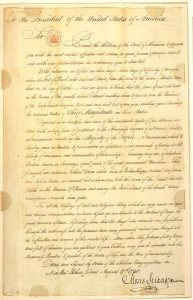Giving Thanks For Our Freedom – A Weekly Letter From Rabbi Alexander Davis – November 21, 2018
Shalom Chaverim,
On this Thanksgiving and despite what we witnessed in Pittsburgh, I am thankful for America which has been a welcome home for Jews since our earliest of days. We see that in an exchange of letters between Moses Seixas and President George Washington.
Moses Seixas (Mar. 28, 1744- Nov. 29, 1809) was a first generation Jewish-American. His parents had fled religious persecution and migrated from Lisbon to Newport, RI which had been established as a haven for religious dissenters in 1636. As a merchant, Seixas helped organize the Bank of Rhode Island in 1796. But he is best known for authoring a letter welcoming President Washington to the historic Touro Synagogue where Seixas served as president.

Seixas’ letter to Washington from August 17, 1790.
Washington traveled to Rhode Island in 1790 with his then Secretary of State, Thomas Jefferson. His visit to the city was largely ceremonial and celebratory- the state had ratified the Constitution just a few months earlier. His visit to the Jewish community, on the other hand, was part of a larger lobbying effort. Washington needed states to approve Amendments to the Constitution including the Third Amendment guaranteeing religious freedom (when the first two amendments failed to pass, this became the First Amendment).
While there was no official religion in the original states, their colonial charters often did not distinguish between religion and government. It was assumed that the government was built on Christian principles and that non-Christians were to be simply tolerated.
In his letter, Seixas insisted that official toleration be affirmed by the new president. He wanted assurances that Rhode Island’s 300 Jews would receive the same rights and privileges as other Americans. The words he penned on Aug. 17 and read to President Washington in the synagogue the following day have become a part of our national lexicon:
Deprived as we heretofore have been of the invaluable rights of free Citizens, we now with a deep sense of gratitude to the Almighty disposer of all events behold a Government, erected by the Majesty of the People—a Government, which to bigotry gives no sanction, to persecution no assistance—but generously affording to All liberty of conscience, and immunities of Citizenship: deeming every one, of whatever Nation, tongue, or language, equal parts of the great governmental Machine.
Seixas congratulated Washington on his inauguration and prayed for his success comparing Washington to Moshe leading the Israelites through the desert. In this passage, he reminded the president of the historic persecution of the Jewish people and called on him to grant Jews equal protection. Washington was not satisfied, however, with mere toleration. Writing a response four days later, he expanded on Seixas’ sentiments and his language:
All possess alike liberty of conscience and immunities of citizenship. It is now no more that toleration is spoken of as if it were the indulgence of one class of people that another enjoyed the exercise of their inherent natural rights, for, happily, the Government of the United States, which gives to bigotry no sanction, to persecution no assistance, requires only that they who live under its protection should demean themselves as good citizens in giving it on all occasions their effectual support.
Washington borrowed Seixas’s phrasing and added to it in significant ways. He differentiated between the more passive religious toleration and the more potent religious liberty implying that religious freedom was a natural right that preceded any constitution or laws. Moreover, he made loyalty to country, as opposed to Protestant allegiance, the prerequisite for religious equality. This was a moral vision that balanced respect for religious difference with the responsibilities of citizenship.
Following his inauguration, Washington corresponded with many faith communities which had sent greetings to the new president. But this letter to The Hebrew Congregation of Newport became a foundation stone of religious liberty and the principle of the separation of church and state.
Each year, the Touro Synagogue re-reads Washington’s letter in a public ceremony. As we sit down for Thanksgiving and as we look ahead to Chanukah, we take to mind the conclusion of Washington’s words calling upon us not just to celebrate our freedom but to use it to be a blessing to our Nation:
May the Father of all Mercies scatter light and not darkness in our paths and make us all in our several vocations useful here, and, in His own due time and way, everlastingly happy.
Bivrakha,
Rabbi Alexander Davis
adavis@bethelsynagogue.org
Sources:
http://www.tourosynagogue.org/history-learning/gw-letter
https://www.mountvernon.org/library/digitalhistory/digital-encyclopedia/article/moses-seixas/
https://www.tolerance.org/magazine/spring-2012/give-bigotry-no-sanction
